This is the presentation I made recently on employment issues and disability in the Overseas Territories. In the spirit of transparency I think people do need to know what I’m saying when I speak about Montserrat at these big conferences. Also if you are campaigning for something you need allies, which means you have to make your point publicly. The Governor and FCDO have both said employment issues in the civil service, and in the wider Montserrat economy, are not their responsibility so we are looking for the Montserrat Government to address these issues for us. The Commonwealth Disability Forum now wants to work with us (us being MAPD) on the issues, which will help, but I still need to keep explaining it all, for the benefit of those interested, or potentially interested.
This conference, or Summit as it is called, was held in Belfast this year and the Northern Ireland Government had specifically bid to host it. Northern Ireland has a particular problem with the employment rate among persons with disabilities, and the wage gap. By enticing the Summit over from the USA they hoped to showcase ideas for dealing with the problem, and draw attention to it. Some of the people who were there, I knew from Disabled People’s International, so adding the Emerald Isle of the Caribbean to the agenda seemed like a good idea. It would be lovely to go back one day with a successful Montserrat initiative.
I didn’t write anything for this one. It was a mixed audience, featuring people from local businesses, civil servants, and persons with disabilities, and from different countries, so I thought I’d just talk to pictures. My presentation was broadcast live, and I thought I’d be able to get access to a recording afterwards, but it wasn’t to be. But the slides were posted on the App and here is what I think I said. (UPDATE: It appeared on YouTube in early 2024 https://www.youtube.com/watch?v=LI13–M3Q3c&t=551s )
I don’t remember where I got these photos from by, the way, they were just on my hard drive, so apologies if one is yours. I think they largely came from social media posts by the Tourism Division.
So here goes…
1-3) The first three slides were introduction to the overseas territories. The Iceman slide is because I wanted to start the presentation with a Caribbean voice, and Iceman in particular. The technician set the presentation up to play Iceman’s “Left for Dead” with a single click.

4-6) Next is an introduction to Montserrat. Despite all our efforts, it’s not as well-known as we’d like, but I thought the audience would like the Irish connection.

7-9) Next is an explanation of why Montserrat is rebuilding.

10-12) How it looks on the ground
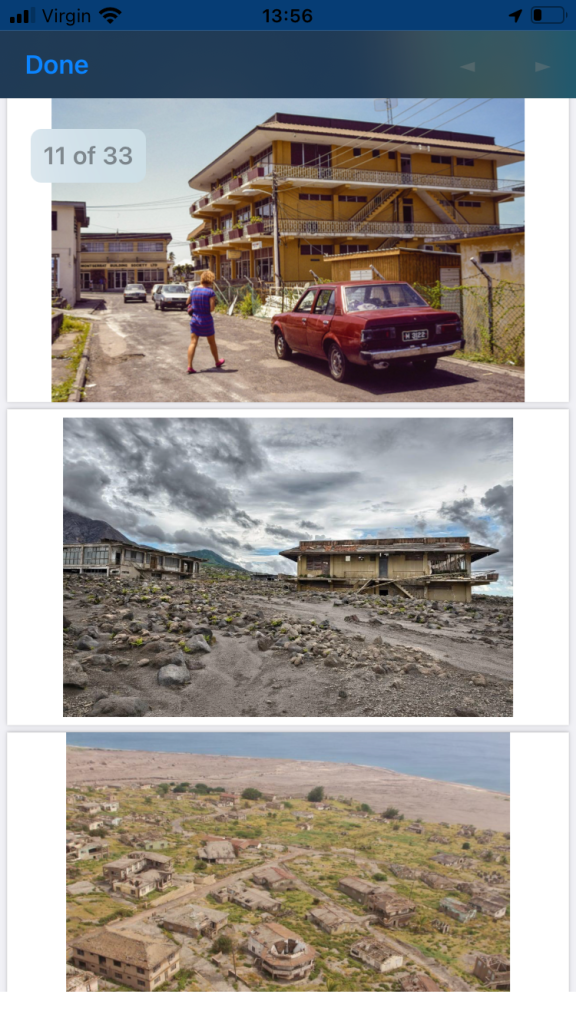
13-15) Next, the rebuilding of the infrastructure is happening

16-18)
Then a gentle introduction to the problems with development of social policy. The documents at the bottom are the 2022 FCDO disability policy, that adopts a Human Rights approach to disability, and the 2012 White Paper governing the relationship between the UK and the OTs, which doesn’t. The 2022 policy does not cover the OT’s because disability issues have been devolved. This means that the approach to disability rights in the OTs differs from territory to territory.
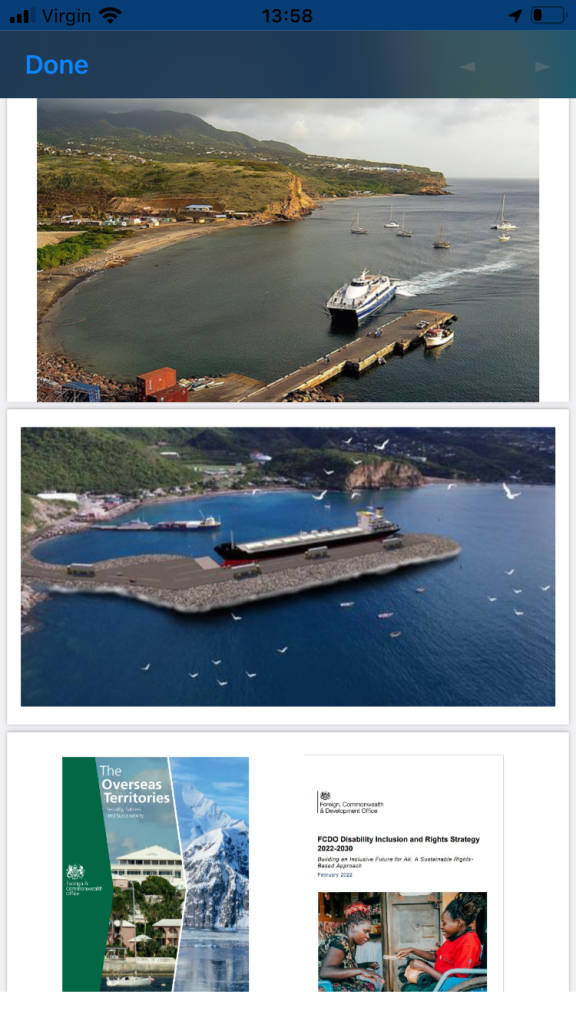
19-21
The first slide below sets out the two approaches. The second compares the current approach with a proposal made by the Island Rights Initiative. It suggests that the UK position on disability, in respect of the aid dependent territories, may be more to do with controlling the aid budget than delegating responsibility as a matter of principle. The UK Government has a legal duty to meet the “reasonable needs” of all Montserratians but if it has agreed with the OTs that it doesn’t have to fund disability inclusion, nor take responsibility for legal issues relating to that, then that keeps them out of the quicksand. The impact assessment on the new port (the last slide below) sets out the scale of the problem.
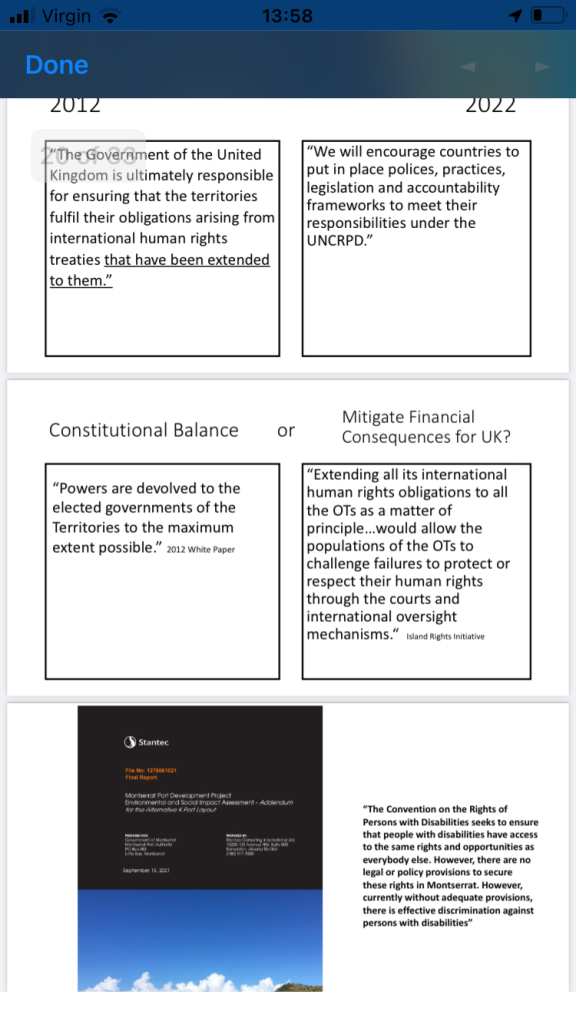
The first slide below provoked some laughs and gasps, but it is really there as a physical representation of a wider problem, not as light relief. Whenever Montserrat gets some money for tourism development it builds more beach toilets, and we now have 6, which is one for every 750 residents, (and well under half that if you count urinals and cubicles.) But this isn’t about toilets, its about governance. This building could not have been built anywhere else in the world, and in most countries there would be laws that could be used enforce its demolition and rebuild (or maybe in this case, given that this is a beauty spot, and not very busy, not rebuild.)
I did emphasise that this is a brand new building, and that the Business Case for UK aid to Montserrat 2019-22 explicitly states that issues of accessible building design will be addressed; The funding conditions of the EU aid that paid for this facility also require public buildings to be accessible; The tourism strategy, which contained the proposal to build more toilets, said they would be accessible; and the current Building Regulations require a gap below the door of no more than half an inch. But still it was built. The designs were never made public before construction started, and people started pointing out the problems long before it was completed. But still work continued. This presentation is about employment, but if serious governance issues exist in the creation as something as visible as this, you can assume that they exist in the less visible policy areas. More importantly, does anyone care?
This is picked up in the two slides beneath. Public Services International has covered the employment issue, and the last slide shows how the Montserrat Government has exempted itself from parts of the Labour Code. The last slide also shows how even the British Red Cross has adopted a disability confident scheme to encourage disabled people into the workforce, but doesn’t apply it to its Overseas branches.
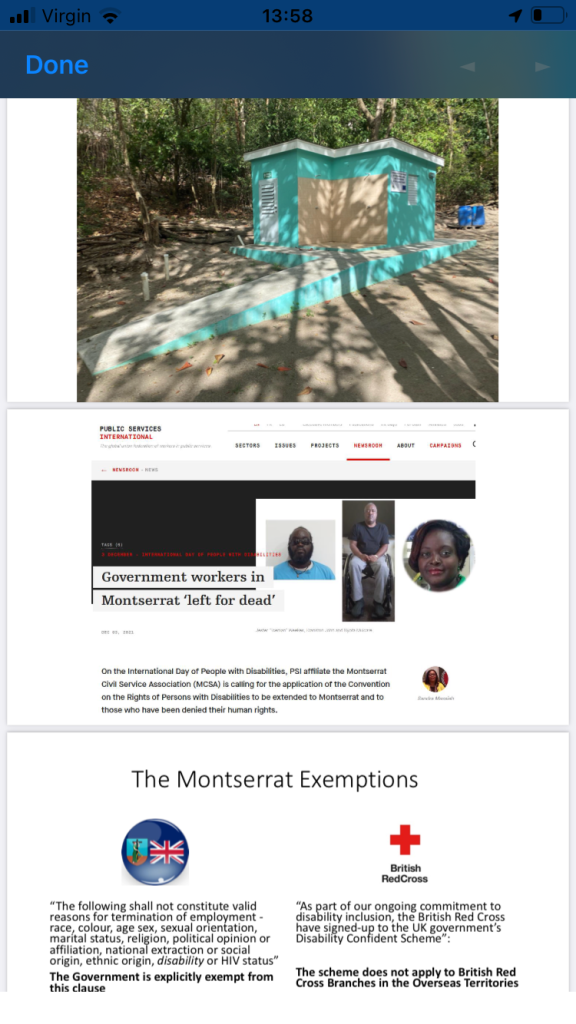
The next three are more of a deep dive. The first is the FCDO annual report, which mentions all the great things that the department does for disability around the world, but it specifically states that it doesn’t do anything in the OTs because that is devolved. Then there was a discussion about why the civil service still operates under the Colonial Regulations of the British Empire. They don’t even exist as a single document anymore due to many minor variations made over the years. That’s an article for another time, but it’s a local choice and there is a reason for it. I also went over some of the potential human and civil rights abuses that the General Orders contain, and their origins. e.g, the power to sack women who are married to another civil servant, the restrictions on freedom of movement, restrictions on the right to stand for election, and the power to dismiss the disabled. All had their origins in orders written generations ago for entirely different purposes to how they are currently interpreted.

These slides again ask the question who is in charge? Who do we talk to to get changes made? Is the civil service in charge of itself? If so how do we modernise it?
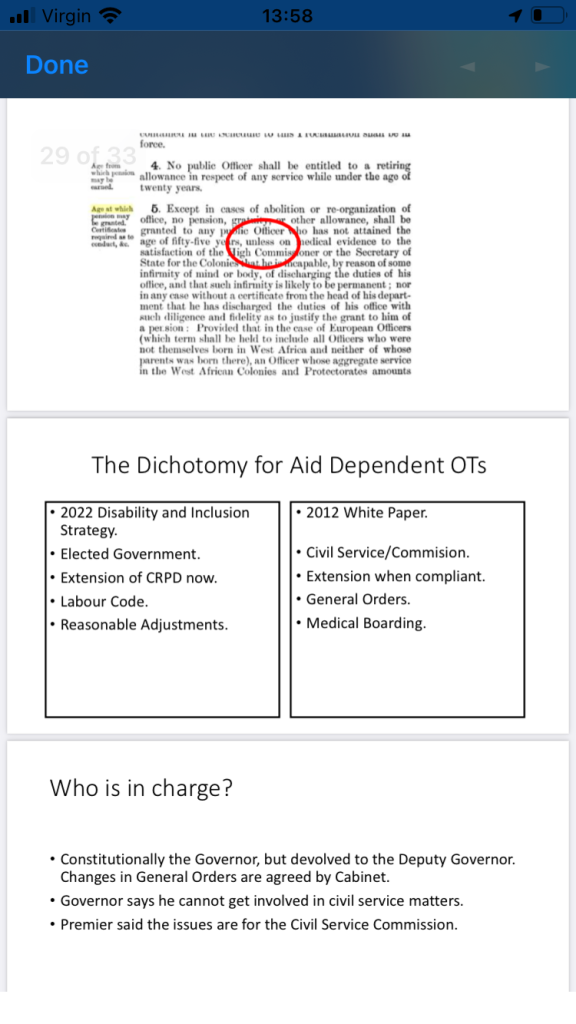
The last three slides conclude by offering a solution. The UN has resolved that the British and Montserrat Government should work together on these issues, and in my view, a first step would be to simply collate all the existing laws, regulations, and funding conditions into a single document. Call it the Montserrat disability framework, and then seek to embed it across all of Government. It’s not the end, but it’s a start.
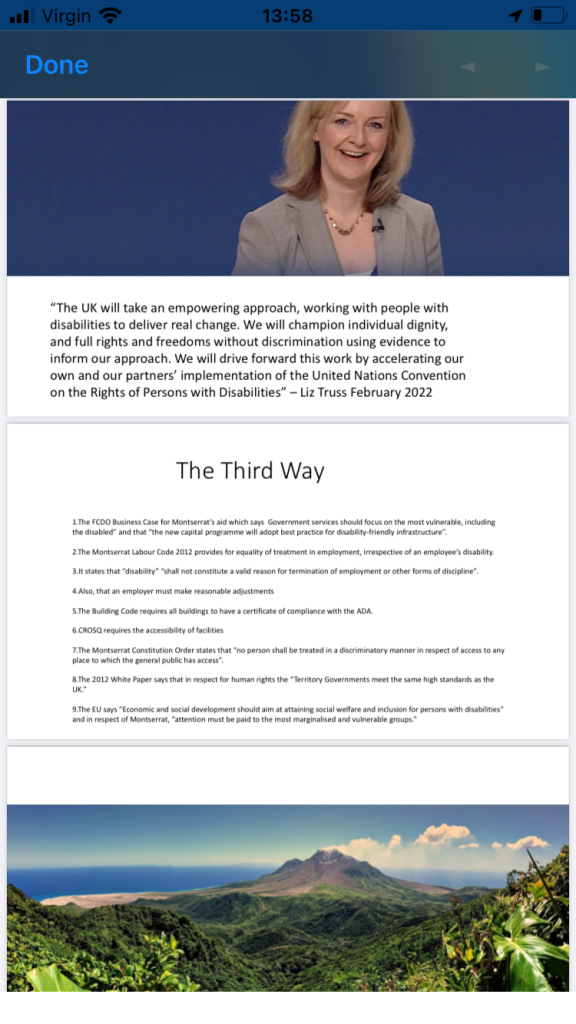
And that was it. There was an interesting discussion afterwards about parallels with Ireland, particularly relating to the legal status of women not that long ago. Also the fact that many of the General Orders are also in use in other former British Colonies. They are loved by many. The consensus was that it was one of the more interesting presentations. That’ll do for now. Incidently, the Ministers responsible for disability in both the UK Government and Northern Irish Government were at the Summit, but didn’t come to my session.

Hats off to you on your presentation in Belfast – this is not an area I know anything about (other than following your blog!) but it looks as if you have done a great job. I hope someone takes notice (but who? – As you mention). One question: you say “Also the fact that many of the General Orders are also in use in other former British Colonies. They are loved by many.” Is that true, are they really loved by many?
LikeLike
Thanks. The adherence to the General Orders is largely about compensating for weak Governance. The concept comes from the military service, and deviations can be seen as treason. In Zimbabwe the same General Orders were used all through the Smith and Mugabe regimes. The problem is that the power ends up residing with whoever it is who is responsible for interpreting the General Orders. That can vary from order to order. Also there are several Orders that people haven’t spotted, which in theory could be used at anytime. They are very sexist. The DG went to court in 2019 to defend her decision that all civil servants are public officials, as referred to in the constitution, and therefore have no right to stand for elected office. It is a situation unique to Montserrat, and criticised by the election observers, but the outcome of the Court Case was that in the absence of legislation, the DG is able to make that decision. There is a similar situation with the procurement regulations. Most developing countries have procurement regulations based on a model law produced by UNITRAL, but they all (or nearly all) exclude the clause that allows for a competitive negotiation process. Politicians in developing countries don’t trust their own ability to set up a governance process that could ensure that it was done fairly, so everything has be done through open tender. In Montserrat, and most other Caribbean countries, negotiation is also banned. Of course that doesn’t prevent fraud, but it is believed that it limits discretion, and that it was a General Order is meant to do. Incidently, the DG recently sent an email to all staff saying that within the civil service the spread of COVID would be managed by using the General Orders. If the focus is on control, then why not?
LikeLike
I have to say well done and a very impressive round-up on several key issues that by chance coincide with ones I pursue is various guises. When you refer to “disability issues devolved” you could equally have said “human rights issues” and for the same reason, more a cop-out to keep “ForeignAid” budgets down not forgetting the argument as to whether the UK’s obligations to its OTs should come from that pot anyway. Perhaps Sir Lindsay Hoyle’s visit to St Helena last week and the several Parliamentary enquiries examining OTs will shed more light on these issues. Suffice to say for now that disability issues – and I hasten to stress that includes physical, sensory, and psycho-social forms – have endured the same fate and lack of attention on St Helena as you describe for Montserrat, despite efforts of some hardy individuals. I will also say that “toilet humour” does get to make some good points, especially where it points out sheer nonsenses, such as marked different treatments between guest or tourist facilities and those of humble local folks. In this sense, Cambodia still pips you for top prize, sorry to tell you, but your audience can now relieve themselves! https://www.theguardian.com/world/2016/feb/21/40000-dollar-toilet-built-for-thailand-princess-visit-to-cambodia
LikeLiked by 1 person
Thanks. Since making this presentation I realised that the ECHR may be the solution. Article 14 covers discrimination and the EU members collectively agreed they would extend it to their OTs. Withdrawal from the EU doesn’t reverse that. There is lots of case law on article 14 regarding what it does and doesn’t cover, but as far as I am aware there is no route to the ECtHR from the OTs.
LikeLike
Yes the UK is distinctly shifty about ECHR even before the current Tory machinations as FCDO doesn’t want outsiders in on its patch, i.e. the OTs, as it exudes post-colonial contradictions of talking the talk while not walking the walk. I don’t think that its territorialism has been tested much but for sure it does not accord with various UN mechanisms such the Special Committee on Decolonization. The original UN Declaration on the Rights of Disabled Persons (UNDRDP), to which its signed, does not give opt-outs. To be honest it may not be so much of a conscious deliberate policy but more a manifestation of the culture and attitudes of the small circle of “brilliant” people that occupy FCDO and their particular priorities like controlling money. Oddly in the old days, when there was a Colonial Office, the officials were then far more knowledgeable and attuned to the OTs. It was back in pre-air flight days when they accepted long tours of duty in postings, not the 2-3 years stints these days interspersed with numerous trips home. Another oddity, My UK-funded project did the first Cambodian translation of UNDRDP – that was OK, but then Cambodia is not an OT!
LikeLiked by 1 person